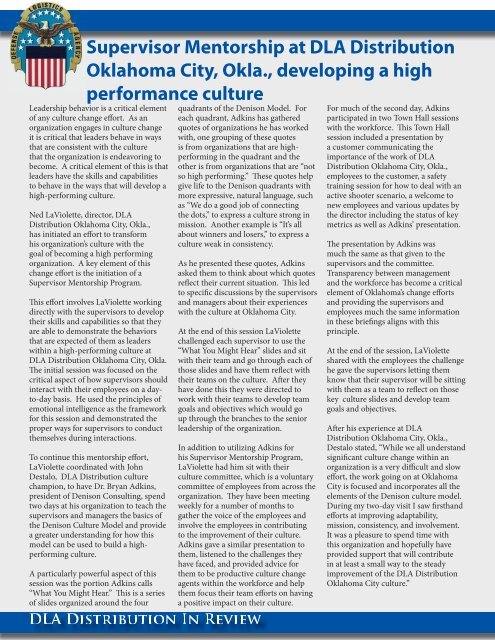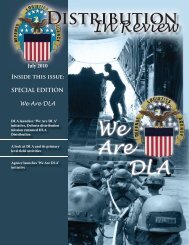Distribution - DLA Distribution Home - Defense Logistics Agency
Distribution - DLA Distribution Home - Defense Logistics Agency
Distribution - DLA Distribution Home - Defense Logistics Agency
You also want an ePaper? Increase the reach of your titles
YUMPU automatically turns print PDFs into web optimized ePapers that Google loves.
Supervisor Mentorship at <strong>DLA</strong> <strong>Distribution</strong><br />
Oklahoma City, Okla., developing a high<br />
performance culture<br />
Leadership behavior is a critical element<br />
of any culture change effort. As an<br />
organization engages in culture change<br />
it is critical that leaders behave in ways<br />
that are consistent with the culture<br />
that the organization is endeavoring to<br />
become. A critical element of this is that<br />
leaders have the skills and capabilities<br />
to behave in the ways that will develop a<br />
high-performing culture.<br />
Ned LaViolette, director, <strong>DLA</strong><br />
<strong>Distribution</strong> Oklahoma City, Okla.,<br />
has initiated an effort to transform<br />
his organization’s culture with the<br />
goal of becoming a high performing<br />
organization. A key element of this<br />
change effort is the initiation of a<br />
Supervisor Mentorship Program.<br />
This effort involves LaViolette working<br />
directly with the supervisors to develop<br />
their skills and capabilities so that they<br />
are able to demonstrate the behaviors<br />
that are expected of them as leaders<br />
within a high-performing culture at<br />
<strong>DLA</strong> <strong>Distribution</strong> Oklahoma City, Okla.<br />
The initial session was focused on the<br />
critical aspect of how supervisors should<br />
interact with their employees on a dayto-day<br />
basis. He used the principles of<br />
emotional intelligence as the framework<br />
for this session and demonstrated the<br />
proper ways for supervisors to conduct<br />
themselves during interactions.<br />
To continue this mentorship effort,<br />
LaViolette coordinated with John<br />
Destalo, <strong>DLA</strong> <strong>Distribution</strong> culture<br />
champion, to have Dr. Bryan Adkins,<br />
president of Denison Consulting, spend<br />
two days at his organization to teach the<br />
supervisors and managers the basics of<br />
the Denison Culture Model and provide<br />
a greater understanding for how this<br />
model can be used to build a highperforming<br />
culture.<br />
A particularly powerful aspect of this<br />
session was the portion Adkins calls<br />
“What You Might Hear.” This is a series<br />
of slides organized around the four<br />
quadrants of the Denison Model. For<br />
each quadrant, Adkins has gathered<br />
quotes of organizations he has worked<br />
with, one grouping of these quotes<br />
is from organizations that are highperforming<br />
in the quadrant and the<br />
other is from organizations that are “not<br />
so high performing.” These quotes help<br />
give life to the Denison quadrants with<br />
more expressive, natural language, such<br />
as “We do a good job of connecting<br />
the dots,” to express a culture strong in<br />
mission. Another example is “It’s all<br />
about winners and losers,” to express a<br />
culture weak in consistency.<br />
As he presented these quotes, Adkins<br />
asked them to think about which quotes<br />
reflect their current situation. This led<br />
to specific discussions by the supervisors<br />
and managers about their experiences<br />
with the culture at Oklahoma City.<br />
At the end of this session LaViolette<br />
challenged each supervisor to use the<br />
“What You Might Hear” slides and sit<br />
with their team and go through each of<br />
those slides and have them reflect with<br />
their teams on the culture. After they<br />
have done this they were directed to<br />
work with their teams to develop team<br />
goals and objectives which would go<br />
up through the branches to the senior<br />
leadership of the organization.<br />
In addition to utilizing Adkins for<br />
his Supervisor Mentorship Program,<br />
LaViolette had him sit with their<br />
culture committee, which is a voluntary<br />
committee of employees from across the<br />
organization. They have been meeting<br />
weekly for a number of months to<br />
gather the voice of the employees and<br />
involve the employees in contributing<br />
to the improvement of their culture.<br />
Adkins gave a similar presentation to<br />
them, listened to the challenges they<br />
have faced, and provided advice for<br />
them to be productive culture change<br />
agents within the workforce and help<br />
them focus their team efforts on having<br />
a positive impact on their culture.<br />
For much of the second day, Adkins<br />
participated in two Town Hall sessions<br />
with the workforce. This Town Hall<br />
session included a presentation by<br />
a customer communicating the<br />
importance of the work of <strong>DLA</strong><br />
<strong>Distribution</strong> Oklahoma City, Okla.,<br />
employees to the customer, a safety<br />
training session for how to deal with an<br />
active shooter scenario, a welcome to<br />
new employees and various updates by<br />
the director including the status of key<br />
metrics as well as Adkins’ presentation.<br />
The presentation by Adkins was<br />
much the same as that given to the<br />
supervisors and the committee.<br />
Transparency between management<br />
and the workforce has become a critical<br />
element of Oklahoma’s change efforts<br />
and providing the supervisors and<br />
employees much the same information<br />
in these briefings aligns with this<br />
principle.<br />
At the end of the session, LaViolette<br />
shared with the employees the challenge<br />
he gave the supervisors letting them<br />
know that their supervisor will be sitting<br />
with them as a team to reflect on those<br />
key culture slides and develop team<br />
goals and objectives.<br />
After his experience at <strong>DLA</strong><br />
<strong>Distribution</strong> Oklahoma City, Okla.,<br />
Destalo stated, “While we all understand<br />
significant culture change within an<br />
organization is a very difficult and slow<br />
effort, the work going on at Oklahoma<br />
City is focused and incorporates all the<br />
elements of the Denison culture model.<br />
During my two-day visit I saw firsthand<br />
efforts at improving adaptability,<br />
mission, consistency, and involvement.<br />
It was a pleasure to spend time with<br />
this organization and hopefully have<br />
provided support that will contribute<br />
in at least a small way to the steady<br />
improvement of the <strong>DLA</strong> <strong>Distribution</strong><br />
Oklahoma City culture.”



